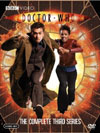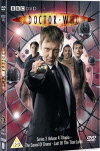DVD Extras (box sets only) include:
Sci-fi aficionados will not fail to spot all the elements pinched from the novels of H.G. Wells. First come the parallels to "The Time Machine", with the TARDIS's run-away flight from present-day into what wants to be the farthest future we've ever seen on the show, where society is no more and wild creatures roam the terrain. This comes complete with the ruins of a lost city built vertically in a great crack in the ground. A nice bit of cultural eye-candy, which, along with a unique reason for shooting at night, spices up the typical quarry location doubling for an alien planet enough to make the exercise extremely worthwhile without breaking the budget. They should do this kind of thing more often, for God's sake.
The Island of Dr. YanaThe strongest and most lasting bit of pinched imagery however comes from "The Island of Dr. Moreau", with a fenced-in scientific compound guarded from wild, primitive creatures, while the mad scientist himself toils away with a loyal female creature by his side. And yes, he's very civil with guests, as our protagonists discover when they come knocking at his, er, fence.... all until his secrets come out and they discover his plans.If you saw these parallels as I did, your sense of anticipation may well have tanked as mine did. The creatures of "Island of Dr. Moreau" have never been successful on the screen, not in the Val Kilmer / Marlon Brando feature film, not in the rip-off Season Three finale of Sliders, and certainly not here either. The bunch of painted-up extras with false teeth here suffer the same problems as the bear-suit man at the beginning of "The Androids of Tara" (story no. 101), trying desperately to look scary without the script giving them any really threatening thing to accomplish. Director Graeme Harper gets a major minus mark here for allowing them to come off as retarded as they eventually do. Other than as rip-offs of the "Moreau" story, there really doesn't seem to be any reason for them being what they are, when they could have been some more interesting sci-fi threat. But thankfully, "Utopia" never intended to dwell on them, and the plot of the story shifts significantly until it mirrors parts of "Star Trek: First Contact" and any other older sci-fi show that was about the launching of a rocket. Nice move, delivering us something far better, far more sci-fi, far more "Who-ish" than we at first anticipated. And Professor Yana turns out to be far more engaging and charismatic than any version of Dr. Moreau. Excellent! Chantho also turns out to be a decent, multi-faceted character, giving us a good insight into the original civilization of the planet. All good. Too bad we don't get to learn more about Chantho's culture, and its downfall, but better to leave us wanting more than to under-deliver with a budget-conscious flop. Oddly enough, the deviance of the Moreau story is in part booted out of place by the usual Davies love-in for the human race, exemplified during the scene of Creet's guided tour of the refugee halls, while the Doctor's narration drives the angle home. Not very original for this show, but much better than "Moreau". The rocket launch, in combination with the threat at the fence, gives us all we need to make the stratagems of the middle act very satisfying and give the Doctor and Captain Jack a good number of solid victories. Nice.
Arch EnemyDerek Jacobi's stellar performance is undoubtedly the highlight of the story. In particular, he is very, very excellent as Professor Yana. His performance doesn't quite seem to be as much on the money at the very end of the story, when he becomes the Master. Perhaps he's trying too hard; perhaps he displays too much anger. It may in part also be the look of the character now being so different to what we older fans remember and expect and want to relive.Indeed, the climax of this story is like the eye of the needle through which all the season's story arcs need to thread themselves, and this is the fulcrum upon which the biggest balance of anticipation and delivery will teeter. For new fans of the modern show only, the delivery of the Master may easily satisfy, although they may indeed not appreciate all the hype surrounding the anticipation and build up. For older fans, the build-up works wonderfully, and has probably been stretched out too long, yet when it comes to delivery, it's just too different from what we expect and want. Whenever a new Doctor comes along, we fans allow him to be different from his predecessors in style. Should we allow the Master the same luxury? Anthony Ainley and Roger Delgado were similar enough that the character has not really challenged us in that way.... until now. Even with the Doctor, or Romana or Borusa for that matter, certain aspects of the character need to remain constant, otherwise it's really a completely new character that you've got who deserves their own name and title. There's a certain combination of charm, elegance, deadliness, and glee that defines the Master, and the goatee beard combined with dark features added something to the elegance part of that equation that Season 29 deliberately chose to not aim for. There is something about the Derek Jacobi version that suggests the Master isn't quite back yet, which works within the story. But if there is something missing from that version, there's even more missing from the John Simm version that later takes over - and if the extras are to be believed, it was specified in the script. Simm goes over the top all too easily. The elegant, restrained charm that one expects has given way to a theatricality that tries way too hard and seems designed to entice only the limp of wrist, if that. Perhaps there's a reason why Davies usually only writes women and monsters as villains. In the end, the best presence that the Master makes in Season 29 is in the voice over flashback. Anthony Ainley's distinctive evil chuckling, followed by Roger Delgado's line from "The Daemons" (story no. 59) "You will give your power to me!" mark some of the best moments of the story, and the season for that matter. Excellent! The Master's motivations get a clean bill of health in "Utopia", where he is obviously in need of regaining the full sense of self that he had before, as well as ensuring that he remains free. There are hints of grander ambitions as well, remaining as mysteries unrevealed. Revenge is restricted to stranding the Doctor and friends without revealing his plans - a side consideration as it should be. The only questionable part of his motivation is brought up by Captain Jack in this tale - not so much the Master's response to the "Time War", but rather the ridiculousness and believability of the "Time War" itself. I suppose we can't penalize this tale any more than half of the others this decade for that impossible element. One other much-loved element conspicuous by its absence is the Master's TARDIS, which hasn't appeared in Doctor Who since "The Trial of a Time Lord" (story nos. 144-147). Surely this would be the Master's first choice for reaching his goal of freedom? Why does he settle for less? If his TARDIS was a casualty of the "Time War", or prior to that got impounded by the Daleks in the backstory to "The Untitled Paul McGann TV Movie" (story no. 160), or has been separated from its owner since his first teleportation to the planet of the Cheetah-People, some character should come out and say so on a proper episode of Doctor Who.
International Titles:Deutsch: "Utopia"Magyar: "Utópia"Français: "Utopia"Русский: "Утопия"Italiano: "Utopia"This story has become available on DVD:
Note: The full season sets contain commentaries, behind-the-scenes featurettes, and other extras. The smaller volumes only feature the plain episodes. Comments on this article are welcome. You may contact the author from this page:
|









